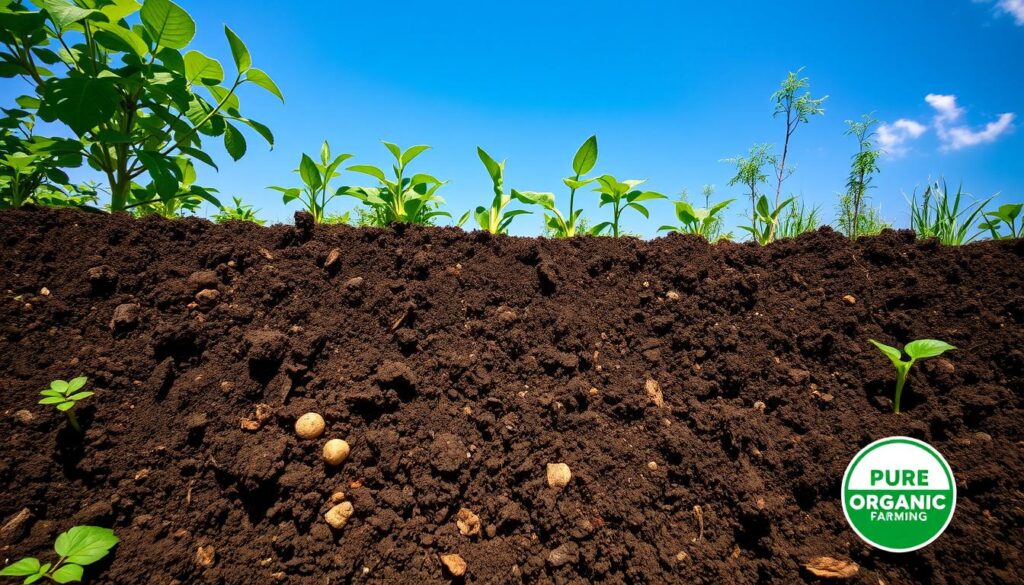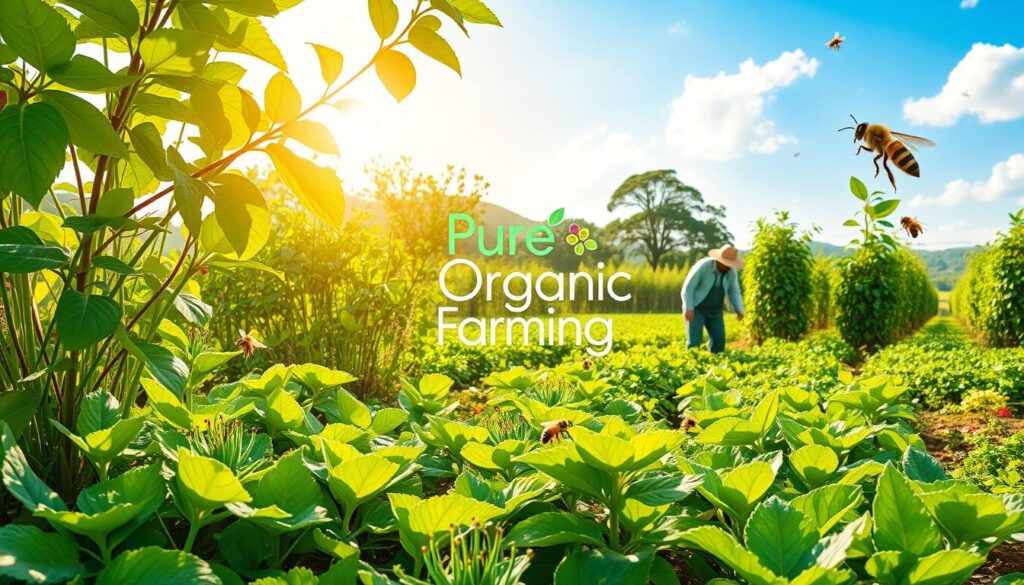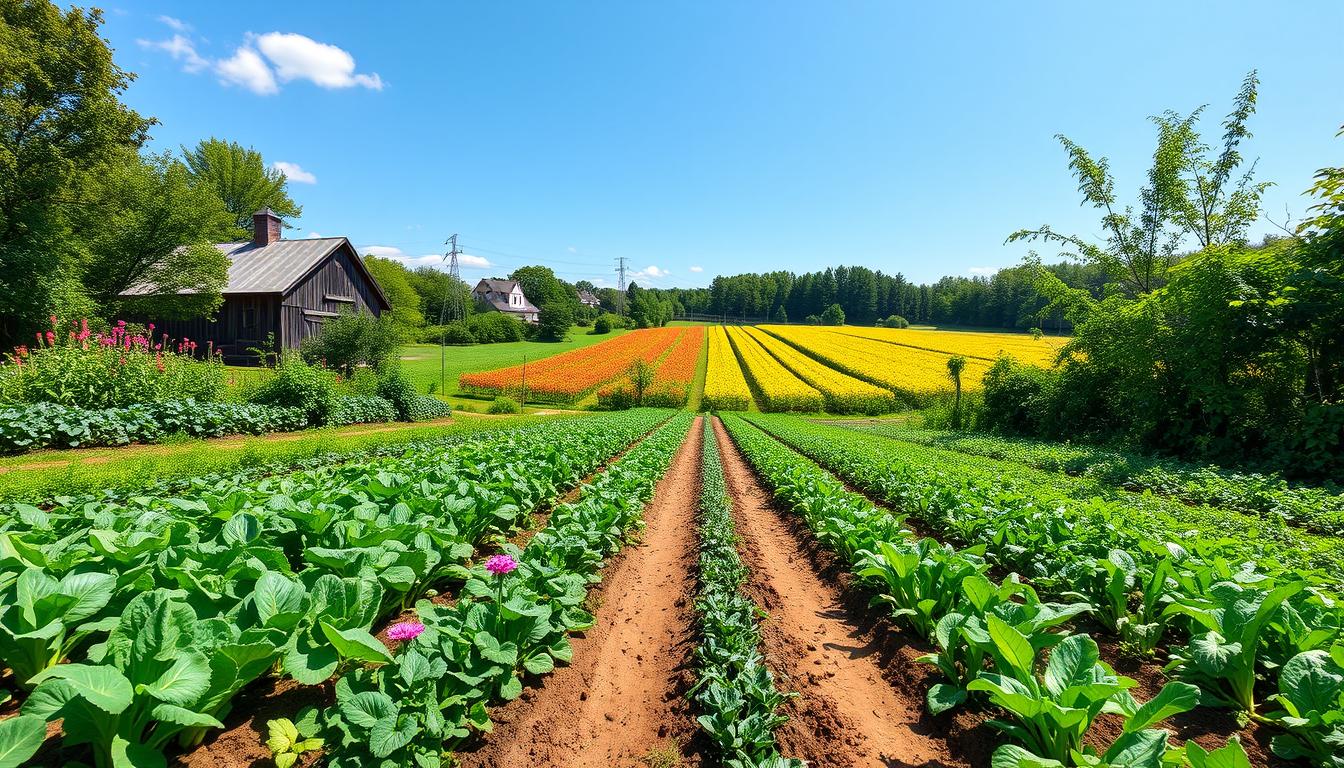Chemical farming is responsible for 70% of the world’s water pollution. There is an urgent need to shift to 100 percent organic agriculture. And this transition is the key to reducing carbon pollution. Going green makes a big difference for the planet, especially in big farming nations such as India.
Less usage of harmful chemicals means pure organic farming. It improves soil, purifies water and promotes healthy plants. This type of farming is good for the earth and provides us food without toxic chemicals. Read on to find out how it helps make our planet a healthier place
Key Takeaways
- Pure organic farming promotes soil health, biodiversity, and efficient water use
- Sustainable agriculture reduces the need for synthetic fertilizers and pesticides
- Natural farming methods contribute to the production of high-quality, chemical-free produce
- Eco-friendly farming practices can reduce water pollution and promote a healthier environment
- Adopting pure organic farming can have a positive impact on consumer health and the economy
- Sustainable agriculture is essential for a healthier planet and a sustainable future
Our Journey into Pure Organic Farming
We started our journey into organic farming because we saw the need for change. We knew conventional farming hurt the environment and people’s health. So, we chose to farm in a way that’s better for both.
Learning about organic farming techniques showed us many good things. Our soil got healthier, and so did our farm. We also learned to reduce pollution and keep our farm healthy.
- Prepared our soil with compost and crop rotation.
- Used organic farming techniques to fight pests and diseases.
- Used water wisely and cut down on waste.
These steps helped us make a better farm and a healthier planet. We’re excited to share what we’ve learned. We want to help others see the good in organic farming benefits and work towards a greener food system.
Essential Components of Our Sustainable Agriculture System
We focus on organic soil management to make soil better. This is key for a healthy farm. Our chemical-free farming keeps the environment safe and our food quality high. We use regenerative agriculture to help plants and animals live together well.
Some key parts of our system are:
- Using natural fertilizers and pest control
- Rotating crops and growing them together
- Using water wisely with good irrigation
- Helping animals and insects live in our farm

Our farming is based on regenerative agriculture and chemical-free farming. This keeps our soil healthy for a long time. It makes our farm good for the earth and people.
| Practice | Benefits |
|---|---|
| Organic soil management | Soil gets better and stronger |
| Chemical-free farming | Less pollution and better food |
| Regenerative agriculture | More plants and animals together |
Implementing Natural Farming Methods
We focus on eco-friendly farming and organic methods. These help keep our soil healthy. We also make sure our farming is pesticide-free, which is better for the environment and our food.
We use compost, manure, and green manure to make our soil better. This makes our soil fertile and helps the ecosystem. We also use natural ways to control pests, like introducing good bugs and rotating crops.
Key Components of Our Natural Farming Methods
- Organic soil management techniques for improved soil health
- Natural pest control solutions to reduce chemical use
- Water conservation practices to optimize water use
We also save water to make farming more sustainable. Our goal is to make food production better for the planet.

By using these organic methods, we keep our soil healthy. We use less pesticides and work towards a greener future for our farm and the world.
Transformative Results from Chemical-Free Farming
Our farm has changed a lot since we started using chemical-free farming. Switching to organic produce made our crops better. It also made our soil and ecosystem healthier.
Using eco-friendly farming, we cut down our harm to the environment. Now, our farm is more sustainable.
Some big wins from our regenerative agriculture include:
- Soil health got better with natural fertilizers and compost
- We have more insects and microorganisms thanks to biodiversity
- Our farm is better at pollination and controlling pests
- Our organic produce is now of higher quality and more nutritious
Regenerative agriculture changed our farm for the better. It lets us grow great crops while being good to the environment. Our farm is now healthier and more productive.
Going eco-friendly helped us use less synthetic stuff. Our farm is now more sustainable and friendly to the planet. We’re proud to help make food systems better.
| Benefits of Chemical-Free Farming | Results |
|---|---|
| Improved Soil Health | Increased crop yields and improved nutritional value |
| Increased Biodiversity | Enhanced ecosystem services and improved pest control |
| Higher Quality Organic Produce | Improved nutritional value and increased consumer demand |
Overcoming Challenges in Organic Agriculture
We started our journey in sustainable agriculture with big challenges. The first was the gap in productivity between organic and traditional farming. But we were set on closing this gap with our eco-friendly and natural methods.
We tackled these challenges in many ways. This included:
- Creating efficient irrigation systems to save water and cut down waste
- Using organic soil management to make soil better and stronger
- Working on market strategies to reach customers who want organic food
These steps helped us grow and gain loyal customers. We also knew it was key to build trust by being open and teaching about organic farming. Our goal is to keep growing and offering top-quality organic products.
Our journey has shown organic farming’s many benefits. It helps the environment, saves resources, and gives us healthy food. We’re excited to keep improving and meet the demand for organic food, making our food system better.
Conclusion: Embracing a Sustainable Future Through Organic Farming
We’ve learned a lot about pure organic farming. It makes us feel more connected to a better future. We’ve changed our farm to be better for the earth and our community.
Organic farming is not just growing food. It’s about taking care of the land and keeping it healthy. It gives us food without harmful chemicals. This way, we help our farm and the planet stay strong.
We’re excited to be part of a bigger movement. We want more farmers, leaders, and people to join us. Together, we can make a better world through organic farming.
